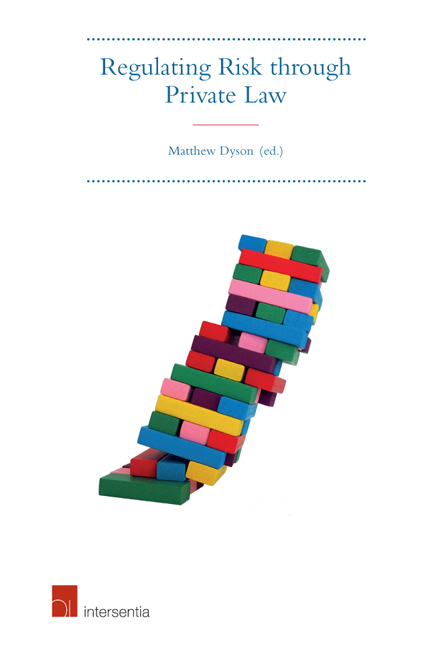Book contents
- Frontmatter
- Preface
- Contents
- Table of Cases
- List of Contributors
- Chapter 1 Introduction
- Part I Risk Overviews
- Part II State of the national art on risk
- Chapter 11 Legal Risk in International Commercial Disputes
- Chapter 12 Medical Accidents and Pharmaceutical Product Liability in France
- Chapter 13 Bearing and Sharing Risk in the Swedish Welfare State
- Chapter 14 Modernisation and Risk Regulation in the Italian Food Sector
- Chapter 15 Motor Vehicle Accidents Caused by Game Wandering onto Spanish Roads
- Chapter 16 Dutch Tort Law at the Crossroads: Judicial Regulation of Health and Environmental Risks
- Chapter 17 Sub Terra: Risk in the Chilean Mining Industry
- Chapter 18 Constitutionalising Rights and Reacting to Risk in South Africa
- Chapter 19 Regulating Risk in Brazil: Resort to General Clauses
- Chapter 20 What does Risk-Reasoning do in Tort Law?
- Chapter 21 Epilogue: What does Risk-Reasoning Tell Us about Tort Law?
- Index
- About the Editor
Chapter 19 - Regulating Risk in Brazil: Resort to General Clauses
from Part II - State of the national art on risk
Published online by Cambridge University Press: 13 October 2018
- Frontmatter
- Preface
- Contents
- Table of Cases
- List of Contributors
- Chapter 1 Introduction
- Part I Risk Overviews
- Part II State of the national art on risk
- Chapter 11 Legal Risk in International Commercial Disputes
- Chapter 12 Medical Accidents and Pharmaceutical Product Liability in France
- Chapter 13 Bearing and Sharing Risk in the Swedish Welfare State
- Chapter 14 Modernisation and Risk Regulation in the Italian Food Sector
- Chapter 15 Motor Vehicle Accidents Caused by Game Wandering onto Spanish Roads
- Chapter 16 Dutch Tort Law at the Crossroads: Judicial Regulation of Health and Environmental Risks
- Chapter 17 Sub Terra: Risk in the Chilean Mining Industry
- Chapter 18 Constitutionalising Rights and Reacting to Risk in South Africa
- Chapter 19 Regulating Risk in Brazil: Resort to General Clauses
- Chapter 20 What does Risk-Reasoning do in Tort Law?
- Chapter 21 Epilogue: What does Risk-Reasoning Tell Us about Tort Law?
- Index
- About the Editor
Summary
WHY GENERAL CLAUSES?
This chapter picks up one of the key characteristics of the Brazilian approach to regulating risk: the use of open-textured general clauses to empower judges to deal with cases equitably. These clauses have been key to developing the Brazilian response to risk in private relationships, in particular in the form of, first, the risk-based strict liability general clause, provided for in the sole paragraph of article 927 of the 2002 Civil Code (2002 CC), which is the apex of this system, and, second, the strict liability general clauses in the 1990 Code of Consumer Protection (1990 CDC).
In order to understand why general clauses are the main legal form of risk regulation in Brazilian laws, a short history of the Brazilian Civil Code is required. On 10 January 2002, the old 1916 Civil Code (1916 CC) was replaced by a new Code. Although the new Code appears to be very modern, one of the first twenty-first-century civil codes, the development of a new Code in Brazil had actually taken a long time. Since the 1940s, successive Brazilian governments have wanted to replace the 1916 CC and, in the early 1960s, two leading Brazilian jurists, Caio Mario da Silva Pereira and Orlando Gomes, were appointed to draft a Civil Code and a Code of Obligations. However, the advent of a military dictatorship in April 1964 ended their work on the draft: even if Orlando Gomes’ socialist views were in no way reflected in the draft legislation, the draft was nonetheless tainted. After a short gap, in 1970, the government appointed another committee of scholars, supervised by Professor Miguel Reale, to draft a new Civil Code.
Professor Reale enshrined three values in the 2002 CC. The first was ‘sociality’ (socialidade), a word which in Portuguese expresses the need for individuals to exercise their rights without causing harm to one another. The social function of contract and property are examples of this value in this Code. The second value was ‘ethicality’ (eticidade), through the principle of good faith, notably inspired by § 242 German Civil Code (BGB). Finally, the third value was ‘flexibility’ (operabilidade), through which he desired to establish a system that was open and permeable to new values, 4 and sensitive to the socio-economic transformations in Brazil, so that courts could promote the development of law faster than parliament.
- Type
- Chapter
- Information
- Regulating Risk through Private Law , pp. 437 - 454Publisher: IntersentiaPrint publication year: 2018



